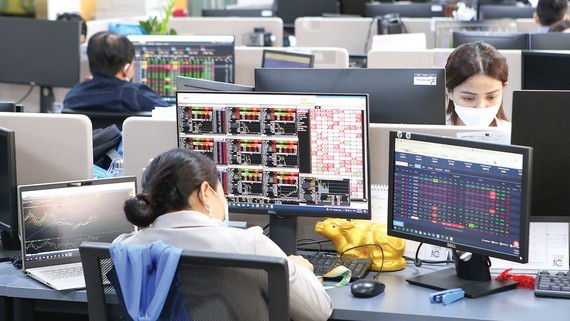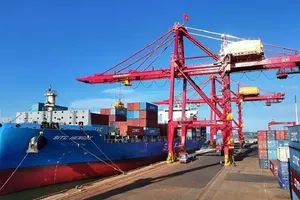
Stock market wobbles
Many investors have expected to hunt good stocks in May because many stocks have plummeted to attractive price ranges from the decline that lasted for the last four weeks. Not only speculative stocks but mid-cap and large-cap ones were also sold off. Neither new investors nor professional investors dare to see their accounts being eroded day by day. Many investors sold to cut losses, and the total accounts lost by 30-50 percent within two weeks.
Not only individual investors but large investment funds also recorded heavy losses in the first four months of the year. Specifically, one of the oldest and largest ETFs in Vietnam, Vaneck Vectors Vietnam ETF (VNM ETF), with a portfolio of US$546 million, saw a decrease in portfolio performance of 23.92 percent from the beginning of 2022. Vietnam Equity Fund (VEF) also recorded a negative portfolio performance of nearly 10 percent in the first four months. In the past month alone, it dropped by 11 percent.
According to experts, the falling of Vietnam's stock market over the past time is in the general downtrend of the global stock market due to rising inflation, tightening monetary policy of the US Federal Reserve (FED), the conflict between Ukraine and Russia, and broken supply chain. Besides, domestic investor sentiment was negatively affected after some leaders of large corporations were arrested, and regulators tightened the corporate bond market, controlled speculation, and limited real estate credit. All these factors have urged many investors to leave the stock market.
And yet, according to an analyst of Phu Hung Securities Company, another reason for the market's rapid decline is that the cash flow has been withdrawn from the stock channel because the prices of some stocks have been pushed to an extremely high level and are no longer attractive after a hot increase in the past two years. The stock prices and the demand declined, resulting in the mortgage lien release. It repeated over and over again, causing investors to panic and be pessimistic, so it triggered the sell-off, causing the market to plunge steeply.
Mr. Truong Hien Phuong, Senior Director of KIS Securities Vietnam, added that the market slumped because many investors had tended to switch to derivatives to clear losses and even make profits. It is proved by the sudden increase in the number of derivative contracts and the skyrocketing liquidity. “The derivatives market is now manipulated more easily by large investors. They only need to use a certain amount of money to affect the index because currently, the underlying liquidity is only VND10 trillion-VND15 trillion per session. It means that there may be big investors somewhere who want to influence the index to profit on derivatives," said Mr. Phuong.
The bright spot of foreign capital attraction
While individual investors continued to be net sellers, foreign investors net bought up to nearly VND5.03 trillion since the beginning of April 2022. Previously, foreign investors net sold VND82 trillion from the beginning of 2020 to the end of March 2022. Experts said that, in the context that the domestic stock market wobbles, the move of foreign investors to net buy again on a large scale is significant support, positively affecting the market.
Mr. Nguyen Duy Hung, Chairman of the Board of Directors of SSI Securities Company, said that international organizations positively assessed the future of Vietnam's economy and the stock market. Mr. Nguyen Thanh Lam, Head of Retail Research at Maybank KimEng Securities Company, also emphasized that the return of foreign investors when Vietnam's stock market declines is a good sign. Foreign investors still place confidence in Vietnam's stock market. The market expects this capital flow will continue to be attracted to catch up with the trend of promoting investment to boost economic growth and recovery after the Covid-19 pandemic in Vietnam.
Besides this bright spot, many people think that Vietnam's stock market still has a good opportunity. Because, in this sharp decline of Vietnam's stock market, the economy has a solid foundation of macroeconomic balance; inflation, exchange rate, and interest rates are not too high and under control; many enterprises are entering the post-Covid-19 recovery cycle with robust profit growth in the next 1-3 years.
Furthermore, at present, the P/E of Vietnamese stocks rarely trades with valuations below the 10-year average for more than two months. Therefore, according to the analysis of Dragon Capital Fund Management Company, Vietnam's stock market is still attractive when compared to other markets in the region. Although there is still the unknown in the short term, the profit potential for long-term investors is obvious. VinaCapital Investment Fund also assesses that Vietnam's stock market is at reasonable prices for a long-term investment with an expected P/E of 11.5 times in 2022. The market can overcome negative events in the short term and move more positively in the rest of 2022 as Vietnam's economy has been recovering strongly from the Covid-19 pandemic, with GDP forecasted to increase by about 6.5 percent this year. Especially, many companies listed on Vietnam’s stock market are forecasted to achieve average profit growth of 20 percent in 2022.
Facing strong fluctuations in the stock market, the State Securities Commission of Vietnam said that the market was still expected to recover and grow again in 2022 and the following years. However, in the context that the market may still have strong fluctuations, the management agency must give special priority to short-term solutions to support the market to stabilize again and reassure investor sentiment.
























